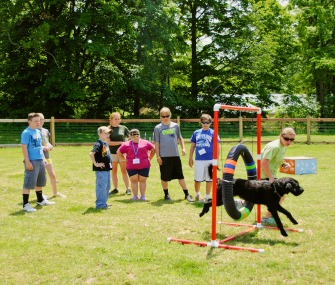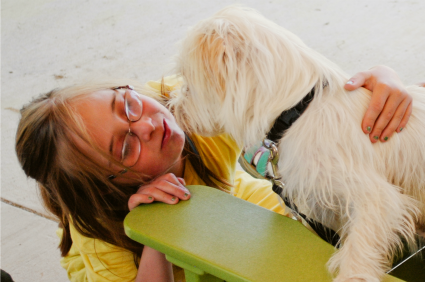Canine Counselors Make Camp Fun for Kids With Serious Illnesses
Published on July 22, 2014

There’s always something special about summer camp. But there’s something even more magical about a camp just for children with serious illnesses, where they can run, jump and play — and where the most popular counselors are dogs.
Flying Horse Farms is a nonprofit program that provides camp experiences at no cost to children battling illnesses such as rheumatoid arthritis, cancer, hematologic disorders, pulmonary disease, gastrointestinal disease, heart disease, kidney disease and craniofacial anomalies.
This year, more than 800 campers will visit the Mount Gilead, Ohio, camp. They’ll swim, boat, fish, hike and participate in archery, arts and crafts, campfires, ropes courses and more, right along with the camp’s canine counselors, a team of highly trained, affectionate, kid-loving dogs.
During their week there, children get constant medical supervision while experiencing camp life. Physicians and medical professionals from across Ohio volunteer their time to provide care to the campers, and every aspect of the program is geared toward the needs of each child. Ropes courses are adapted for children who can’t walk. Wheelchair ramps lead to campfire circles. Fully loaded medical stations are subtly nestled into every outpost. A state-of-the-art medical shack is staffed with nurses and doctors. A helicopter landing pad sits in a clearing, ready for any emergency.
Yet the facility looks just like any other summer camp: grassy fields, swimming pools, a sparkling lake, outdoor amphitheaters and lots of laughing kids.
Mimi Dane, CEO and president of Flying Horse Farms, says the camp is a place where kids can leave behind their everyday lives of treatment and medical struggles. “This is where they come to be kids again,” she says.
Special Dogs for Special Campers
The canine counselors at the camp are courtesy of Joel Slaven, a trainer and animal rescuer whose company, Joel Slaven’s Professional Animals, is one of the larger animal show producers in the world. All of the dogs in Slaven’s programs are rescues, as are many of the other animals the company brings into its family.
Each year the dogs and their trainers go to camp, enhancing the atmosphere and transforming many of the campers’ lives. This summer, three agility dogs and three therapy dogs, along with several of Slaven’s staff, are onsite at Flying Horse Farms.
The canine counselors program has two parts. One is an organized session in which kids work with the dogs, running them through agility courses and “teaching” them tricks. The other component is more organic: The dogs visit activities sites so that the children can spend time with them, playing, laughing or just snuggling throughout the day.
Though the dogs are omnipresent and incorporated into much of the camp’s schedule, if a child is allergic or fearful, appropriate measures are taken to ensure the child’s comfort and safety without excluding him from any camp activities.
Nicole Sills, who manages the canine counselors program for Slaven, says the team chooses specific dogs for the program. “The biggest thing we look for in camp dogs is their ability to be mauled with love by the kids,” she says with a laugh. “But also we need dogs who have a drive to run and have fun with the kids.”
Transformations
Having the dogs at camp has immediate and long-term benefits for the children. “On the whole, you walk the dogs down the lane at camp and it creates smiles,” Sills says. In addition to the general feeling of happiness that dogs bring, they reduce anxiety, instill confidence and offer quiet comfort when needed.
Camp program director Christine Stuart points out that the dogs can help kids develop better communication skills. “Some kids don’t relate to their peers or to people altogether,” she says. “All of a sudden, there’s a dog in their arms and they open up.”
Camp director Ryan Brownfield says he’s in awe of the change in the children. “The transformation is the thing that gets me each camp session,” he says.
One recent camper suffered from behavioral and anger issues. Brownfield says, “We weren’t sure if we would be able to have him at camp or that he’d be able to stay here.” However, after a couple of nights working with the canine counselors on the agility course and spending some calming time with the pups, the camper made a turnaround, even opening up during group sessions about his struggles.

Dane recalls one camper with a debilitating fear of thunderstorms. During a storm one night, the canine counselors visited the cabins as they do each evening. The scared child, cuddling with the dog, suddenly took on a more nurturing role and began comforting the dog. “It made him less afraid,” Dane says. After bonding with the pup that night, the boy began showing bravery in other areas of camp life, including conquering his fear of water. “By the end of camp, we were all calling him ‘Deep End Ken’!” Dane says.
Working with the dogs on agility and training also builds confidence and a sense of mastery for the kids, which, for some, is a rare feeling, Dane says. By learning to “train” the dogs and give them commands, the children are able to, for once, call the shots.
Quiet Comfort
Having the dogs onsite is also helpful for kids who may be homesick and missing their own pets. And, Dane says, some children who can’t have their pets at home because of their treatment light up when they can spend time with the canine counselors.
Though the camp experience is designed to help kids forget their illnesses, sometimes it’s not possible, and campers need a friend to lean on.
Sills recalls a camper who is battling cancer. The camper was in the medical shed receiving treatment. “He was in so much pain he couldn’t talk,” Sills says. The trainers brought one of the dogs to visit. The dog jumped right into bed with the boy, and cuddling and petting the pup seemed to help the young camper tolerate his treatment better. For some kids, the benefits are so notable that they’ve gone on to get therapy dogs after camp.
“There is something special about animals because they give that love back," Sills says.
More on Vetstreet.com:





